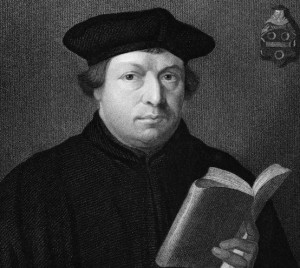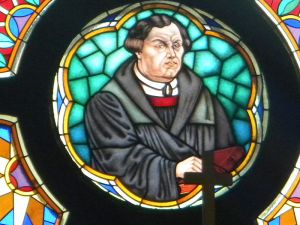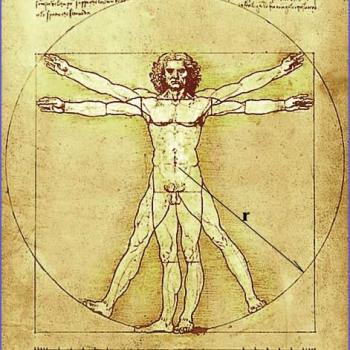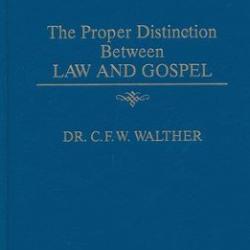
+++
First, happy tenth day of Christmas! Second, the answer to the title of this post is “No!” — with explanation following…
In 1539 a formal theological disputation was held in Wittenberg, Germany called “The Disputation Concerning the Passage: ‘The Word was Made Flesh’” (found in AE 38.239-76).
This disputation is very interesting (it is difficult to)!
In it, Martin Luther contends that the Scholastic theologians from Paris of his time (the “Parisians”) had in effect made theology bow to philosophy (thesis #6).[i] In a fascinating move, Luther responds by stating that “what is true in one field of learning is not always true in other fields of learning” – even while insisting that the statement “every truth is in agreement with every other truth” is to be upheld (theses #1).
Relating to the title of the disputation, Luther connects these thoughts with John 1:14: In theology it is true that the Word was made flesh; in philosophy the statement is simply impossible and absurd.” In a colorful way of putting it, Luther insists that “the declaration ‘God is man’ is not less but even more contradictory than if you would say ‘Man is an ass’” (thesis #3). Going along with this, it is very interesting to note that as Luther discusses issues of philosophy and language he actually anticipates many of the Ludwig Wittgenstein’s observations about language in the 20th century.

“Luther’s disputational theses on John 1:14 [are key]….Before we play the epistemological card [when it comes to matters of the creation and science], we ought to have a thorough reading of how Luther approaches revelation and reason. I think we greatly overplay the ‘whore reason’ remark and make it extend to all matters, from governance and finance, to biochemistry and geology.”
This individual was concerned that Lutherans not fall into a mentality (perhaps based on a kind of fundamentalism) all too eager to question the claims of various secular academics and modern scientific disciplines… The introduction to this disputation in Luther’s works seems to lend support to this view: “Luther conceded that philosophy had its independent meaning and was qualified to set forth the truth in the realm of nature. In the realm of grace, however, theology was to hold sway.”

1) The Sorbonne was the flagship of the via antiqua, classic Aristotelianism, in which as far as language was concerned, promoted the idea that what was said expressed accurately what existed in the world of forms, i.e. that which was ultimately real and true. Consequently, what was said and true in one field of study must be true and be able to be said in another field of study, including theology;
2) Conversely the via moderna (nominalism) promoted the idea that what is expressed must not refer to the world of forms, but to a unique instance of a form in creation, in time and space, that is, to some unique thing, in a one-to-one correspondence, that is, a specific instance of a thing. This was for clarity’s sake in the construction of syllogisms;
3) The problem, however, was that theologically, the “middle term” in a syllogism often could not be a reference to a specific thing in time and space, but a general concept, thus throwing the validity of syllogistic logic to express what was true theologically out the window.
My pastor goes on, commenting on how Illge’s heady academic book speaks to these disputations:
So if I understand what Illge is asserting about this disputation correctly, Luther is exposing logically the inadequacies of both the via antiqua (Aquinas) and the via moderna (Biel) for expressing via language what is true theologically. Thus the assertion that a “new language” is needed when it comes to speaking of Christ and theology…

In order to explain this more, let’s take a look at a part of the disputation (C:IX):
Another [Argument] of the Dean
Falsehood and truth are opposites. But what is true in philosophy is false in theology. Therefore, they are opposites.
Response [from Luther, put together from the notes of three scribes]:
Contraries ought to concern the same matter or be in the same genus….
We say: God is man, which is a simple proposition, not twofold as the Sorbonne has made it. We condemn the latter. Every man is a creature, this is a simple proposition; this is true in philosophy, but in theology it is false, which is proved in the minor premise, that is, Christ is man.
The Sorbonne compels us to make all words ambiguous. This is to be resisted. It is not to be allowed that in this proposition, that is, God is man, one may unite theology and philosophy, because a distinction is made between man and man. The man who uses words univocally speaks consistently, but not the equivocator, and by the fact that they equivocate they destroy their own argument. (italics mine)

In expressing his concerns about equivocation, Luther is concerned first and foremost about the abuse of Scripture leading to the loss of the doctrine of justification (see, e.g., in the “Scholastic doctrine of congruent merit,” which made salvation subject to the law — the meritorious character of works). And justification, of course, is not unrelated to a proper understanding of Christology[iii], and hence the loss of the scriptural language’s meaning through the constricting use of philosophy[iv] (not unrelated, by the way, to the way postmodern philosophy, for example, tries to change Christianity today) – not necessarily intended by those who advocate thusly! – must be countered.

Elsewhere, in the disputation, Luther makes his concerns even more clear: “When the word ‘man’ is used in philosophy it signifies substance; in theology it also signifies the substance existing in Christ, but thus, that it is the substance which is at the same time God” (C:X). Dr. Eric Phillips comments: “When he says, e.g., ‘In philosophy it is false to say that he is God and man’ (250), he is not suggesting that Jesus has two natures in one sense, but is only human in another sense. He is saying only that Philosophy is a valid way of knowing, but cannot know mysteries of the faith.”
Perhaps we could put Luther’s concerns in the following way as well: even though every man is a creature, we should insist this is false in theology because the primary identity of the God-Man Jesus Christ, who comes to possess a true human nature (transforming all who have a human nature!), is not that of a creature.[v]

Attentive readers of my own blog will note that a very similar situation – where philosophy cannot contain theology! – occurs in a recent blog post. Even though believers, in true union with Christ, really are God’s children, the following syllogism, applied to the biblical data, would be null and void:
- Every son of God is divine.
- Human beings are sons of God
- Human beings are divine.
This, of course, is false, as even Scripture – in making us aware of man’s import to the creation – goes so far as to call all human beings not only god’s offspring, but, very hyperbolically, gods as well!
Hence, in sum, “faith is not bound by, or subject to, the rules or words of philosophy….” (C, intro)!” Philosophy is so very limited. Sad!

In his own summary of the disputation, Dr. Eric Phillips says, in part,
“3. There is a lot of overlap, as some things knowable by reason are also communicated by revelation, but the highest and most important things cannot be known by reason at all, and thus belong solely to Theology (AE 38: 248).
4. As Philosophical definitions cannot take these things into account, they will sometimes seem to contradict Theology, but this is not a real contradiction as long as we apply Philosophy only to its own proper sphere. Philosophy and Theology do not agree on everything, as the Paris doctors held, but they can nevertheless both be true (250).

5. The area of overlap corresponds broadly to the Law, and the area where Theology alone prevails to the Gospel (258). Thus when Philosophy oversteps its bounds, it always ends up attacking the Gospel, as e.g. in the Scholastic doctrine of congruent merit (248).
I think this is well summarized because it is clear that the limits that Luther insists on for philosophy are, well… limited (and I admit I see what I take to be his definitions of it as overly stringent as well[vi]).

On the one hand, philosophy is like the law: “the art of logic is a seeker after truth in every field of learning, but in theology it may be a maidservant and bondwoman” (C:XX)[vii] – here, for example, justification is said to be above and beyond the legal wisdom of the law.[viii] On the other hand, perhaps in correlation with the law’s fulfillment as seen and known in Jesus Christ, (interestingly, did not Socrates insist that philosophy, in spite of its interest in the reasons for things, was more about living rightly than anything else?), “philosophy and theology are different but not contrary to each other” (B:XXV).[ix] Analogously, justification is greater than the law simply because its fulfillment – first by Christ and only then by us (imperfectly here, and perfectly in heaven) – is contained in the Gospel.[x]
My own thoughts (see footnote vi also) are that if philosophy – which, considered most broadly, deals not only with causes but purposes[xi] – insists that God has not shown us His eternal nature in the creation, it is not really true philosophy.[xii] Of course, I am equivocating there myself, because in that sentence I don’t think I need to insist that the God – even though He is best understood in the God-Man Jesus Christ – cannot begin to be understood… does not begin to “make sense” to most every human being.
But I just let you know that, so maybe someone like Luther would let me go on that one. : )

FIN
Notes:
[i] According to the introduction in Luther’s Works (AE 38), the Fifth Lateran Council (1512-1517), “ordered theological teachers at universities to uphold the one truth of the Christian religion in philosophical statements also.” On the face of it, it seems like philosophy was being made to submit to theology here, but Luther says that Christian statements were being forced into philosophical statements, with distortion being the necessary effect.
[ii] My view is that at its best today, given the inward nature of our reflection (with Kant having formalized this), the “realm of nature” is understood by modern secular philosophers on the basis of the things they experience, understand, and can cope with in common. I also think philosophers must primarily understand their discipline as being concerned with human ethics, i.e. how should we live. Even those who despise persons they consider overly moralistic still want their neighbors to live in certain ways and not others. How much does this drive all philosophical reflection?
[iii] From A:9: “In philosophy it is false to say that he is God and man. For this reason we separate these spheres in creation to the furthest extent, as the philosopher says. If someone has been continent and aspires to live honestly before men, he is not against Christ. Nevertheless, a tree must be good before it can bring forth good fruits. So a person is pleasing to God on account of Christ’s merit and obedience before he does godly, good, and honest works. Therefore, the barbarians [me: the Parisians] are to be resisted who make everything equivocal if a matter of faith seems to be in question. But we ought to adhere to and speak of the word. I understand “man” here in a twofold way, in one way as a corporeal substance subsisting by itself, in another way as a divine person upholding the humanity. Is this, I ask, harmonizing theology and philosophy when you distinguish like this, when in fact you even distinguish univocal terms?” (italics mine)
[iv] Again, Dr. Eric Phillips: “Luther says the Paris doctors ‘devised the distinction between equivocal and univocal so that philosophy might be in harmony with theology’ (246). However, he seems to use the distinction himself in several of his responses. E.g. “The mathematician says that… three cannot be one, as in the article of the Trinity…. Nonetheless, it is true that the Trinity and unity in God are something entirely different” (255). Thus he is not attacking the Thomist idea that language when applied to God must be understood equivocally (as some of the Medieval Nominalists had, most notably Duns Scotus). His real complaint seems to be with the corollary that agreement (e.g. between Philosophy and Theology) can be established by the use of equivocation…. The need for equivocation when speaking of God actually functions as proof of his “double truth” thesis.” (italics mine, underlining his)
[v] In sum, ultimately the words “man” and “person” are not about us, but about our God:
“When I speak of God as man, I cannot deny that he is a thinking animal; here the Scholastic theologians have admitted that Christ was a rational animal and man. However, they distinguish senses of the word ‘man’ and say that it is equivocal, so that, when it refers to anyone of the human race apart from the incarnation, it designates a person subsisting by himself. This is a philosophical meaning. It has another meaning when it is said about Christ. Here one does not interpolate that fictitious philosophical concept of a person. For here a new word is coined, designating the divine person sustaining our human one, as a white person signifies a man who maintains whiteness (3:IIIa, italics mine).” I find it interesting to note that evidently the philosophers of Luther’s day were willing to emphasize how man subsisted by himself by his own power, while God’s power outside himself was conceded (B:VI) by virtue of the things which he created (i.e. the creation, which in many philosophical systems was seen as synonymous with God).
[vi] I wonder here about whether Luther’s view of logic, syllogisms, reason and philosophy – which I get the impression from this work are basically the same thing to him (philosophy, for example “understands by the use of reason” [C: introduction]) – is too limited. E.g. “the art of logic is a seeker after truth in every field of learning, but in theology it may be a maidservant and bondwoman” (C:XX, italics mine ; see also A:20).
Luther, of course, contrasts this with theological truth, which, he notes (in part, I take it), we are to believe and not to [expect to] understand (and which we do not see, for it is invisible) (see C:VII, A:7 and A:15, and last footnote as well). Luther does say that “the subject of philosophy and theology is identical, that is, the human soul,” even as “they are different in character” (C:XXV). I think that Dr. Phillips is right to say, as he did to me, that “Philosophy isn’t the foundation for theology. Philosophy and theology are the same thing, except that theology (properly Christian theology) uses givens from Scripture, while Philosophy uses givens only from observation and logic.” Luther would probably agree, even as today’s “modern science” — with its appropriation of philosophy (see here for more) — has amputated some of the “givens” (like the soul!) Luther would have taken for granted.
If I had a chance to speak with Luther here, I would explore the idea of faith being about knowledge (particularly historical knowledge), assent and trust, and how it relates to his thinking. In any case, my main point is that it is not only faith that overshadows logic and syllogisms in importance, but other things that do this as well.
This can be bad, for example in the case where impressive rhetoric stirs our passions, verifies us in our confirmation biases, and causes us to act in in an unthinking manner. On the other hand, there are good things about this as well.
For instance, strictly speaking, even if it is true that smoke does not “mean,” linguistically, “fire,” is there not a kind of natural connection here – even if any particular person does not make this interpretation? And it seems to me that many a “common man”, for example, might point out that the connection between “male”, “female” and “offspring” seems to be a bit more than linguistic as well! After all, one does not require formal syllogisms – but only personal experience perhaps bolstered by historical knowledge – to determine that all children have a mother and a father.
And speaking of history – and to really throw any exclusively secular readers here into a tailspin — in spite of, for example, St. Thomas Aquinas’s views of what constitutes knowledge, are historical facts like the existence of George Washington less certain than scientific truths such as the “fact of evolution” (sarcasm intended)? And here, of course, the secular critic will be eager to point out that some historical persons and events are more well-attested to empirically than others. I’ll happily agree – especially about evolution : ) – and ask them whether or not the unrecorded family history they know can really true knowledge or not and why….
[vii] Also: “It is not as mistress but as maidservant and bondwoman and most beautiful helper that it teaches a person to define and to classify. But even for theology [logic has this function]. There [i.e., in theology], if logic falls short, this maidservant also lies dead” (A:20).
[viii] “I admit that the legal wisdom of God is not contrary to that wisdom of the gospel, but is not included in it. Theology, the incarnation, and justification are above and beyond reason and philosophy. Philosophers concede to God omnipotence outside himself in the things which he created.” (B: VI) One notes in this disputation Luther’s conflating of the external observations of philosophers with the external judgements God’s law makes. For example: “There are upright persons in theology and there are upright persons in philosophy. This [philosophical] uprightness is meant for a mother and a father. Thus, in the law of Moses there are upright persons. But we have a more excellent theology which speaks differently about uprightness” (A:26). Here, lest one get the wrong idea, we should immediately add the following: “philosophy and theology are different but not contrary to each other” (B:XXV) – see footnote immediately following as well!
[ix] Also, “philosophy is not against us but for Christ” (A:8). “[W]e admit that philosophy may be for us; but it does not follow from this that both are identical; heaven and the stars are devoted to the church, but they are not at once identical with it” (C:VIII).
[x] As Pastor Jordan Cooper puts it: “The gospel is a superior revelation of God to the law. This does not imply that the two words are to be polarized against one another. Instead, the gospel is greater than the law, because within the gospel is included the fulfillment of the law.” (see here for some more context)
[xi] When, in B:XXVII, a person argues that: “Whoever inquires about the purpose and the causes of things inquires about the word of God. Philosophy inquires about purposes and causes. Therefore, it inquires about the word of God,” Luther only says “It is a subtle argument.” Given that he only says of philosophy that it “inquires into the reasons for things” (A:27) – and everywhere in this disputation seems to equates it with syllogisms and logic – I found this disputant’s introduction of the idea of purpose – which of course connects with issues of teleology and ethics – to be refreshing. Here, one wonders about the gradual reduction of philosophy to efficient causes.
[xii] To argument A:7, “Philosophy attributes to God incomprehensible matters. Therefore, it also attributes to him the power to become man. I prove this from Romans 1 [:20]: ‘His power is eternal,’” Luther begins his response in a way I find perplexing: “If it attributes infinite qualities to God, then it is not philosophy. For Paul in Romans 1 [:19] says that ‘God has shown it to them.’” (see also the argument and response in A:24 where Luther says, e.g., that “[t]he meaning of the law is, under various circumstances, known to the philosophers. But the promises of God belong to theology, and the gospel is not known to every creature because it is a mystery hidden from the world.”) Here, we evidently must speak of [tacit] knowledge of the truth which is suppressed – even unconsciously – and what a person considers himself to know.












